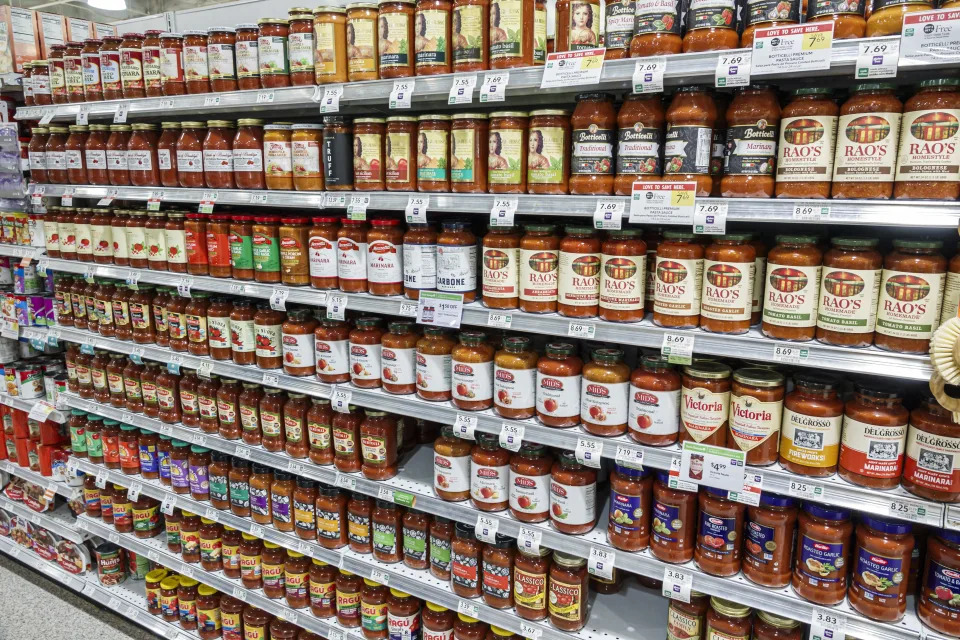Campbell Soup Company ( CPB ) is looking to build a new recipe for success after a beefy acquisition.
Earlier this year, the 155-year-old company acquired Sovos Brands , which owns Rao's sauce, for $2.7 billion.
Now Rao's, which still sources the sauce from a local Italian family, is on its way to becoming the fourth $1 billion brand within the company's portfolio, joining the likes of Goldfish, Pepperidge Farm, and Campbell's Soup.
The company is learning that premium products can sell across the income spectrum, paving the way for future diversification. "What we've learned about Rao’s is that a lot of the growth is not necessarily exclusively coming from high-income households," CEO Mark Clouse told Yahoo Finance at its investor day this week.
Campbell's is looking for growth as packaged food companies struggle with cautious consumers and a still inflationary environment. Its stock is up roughly 10% this year, lagging S&P 500's ( ^GSPC ) 17% gain and Coca-Cola's ( KO ) 19% jump, though beating PepsiCo's ( PEP ) paltry 2% increase.
Rao's currently brings in $0.9 billion in annual net sales, but the company would not disclose when it might cross that billion-dollar threshold.
Even though the brand's canned sauces cost upwards of $8, they're still "a fraction" of the cost of dining out, Clouse pointed out. Rao's is now launching at premium supermarkets with flavors like truffle and balsamic that range from $12 to $14.99.
President of meal and beverages Mick Beekhuizen said the strategy for Rao's and Campbell's other sauce brand, Prego, includes offering multiple price points within the category.

Campbell's success with sauces can open the door for expansion into other areas, such as Mexican sauces or snacks.
"The demographic profile of America is going to continue to evolve," Clouse said. As first-generation immigrants have families, American tastes and palettes will change.
The company is pondering, "How would you create the Rao's for the Hispanic world or the Asian world?" per Clouse. While Campbell's has no acquisition in sight, it's open to opportunities in the future.
The Sovos deal was Clouse's first big move since taking the helm in January 2019. The acquisition comes after former CEO Denise Morrison struggled to find the right fits for additions like Bolthouse Farms and Garden Fresh Gourmet.
In Clouse's first six months, the company divested $3 billion worth of assets, including both aforementioned brands.
"The organization is in a position where ... they can [now] integrate a relatively big acquisition," Bank of America analyst Bryan Spillane told Yahoo Finance.
It's all part of a bigger play to broaden Campbell's portfolio, including changing its name from Campbell Soup Company to the Campbell's Company. The name change is up for vote at its annual shareholder meeting this November.
"I want to strike the right balance because we do love soup ... it is foundational to us as a company and it's a critical business and we are not taking our eye off that ball. But I do think it's fair to say that today our portfolio is different. We've got a lot of different innovators," Clouse told Yahoo Finance.
The company has 16 brands across two main segments — meals and beverages, and snacks. Clouse said the variety of products gives the business "different ways to win."
Campbell's expects to grow organic net sales around 2% to 3% long term. It said the projection reflects the historically consistent 3% to 4% average annual growth rate on snacks and a 1% to 2% increase per year for its meals and beverage business with the Sovos brand acquisition.
Soup itself is projected to be flat in long-term sales growth. Spillane said the numbers aren't worrying.
"A key message yesterday was soup only needs to be flat to hit the targets ... they need to invest in soup for it to be flat, but [it's] clear that they're depending on Rao's and on their snacks business to drive most of the growth," he said.
—
BrookeDiPalma

